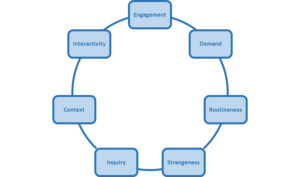Written by Colin Foster and Matthew Inglis:
Many different adjectives are used to describe the tasks that students are given in mathematics lessons. For example, a task could be described as ‘open’, ‘inquiry-based’, ‘procedural’ or ‘rich’. But what do these words mean to teachers and do they understand them in similar ways or in a variety of different ways?
This is important, because if policy makers and curriculum designers advocate the use of, say, “rich and sophisticated problems” (DfE KS4 Mathematics Programmes of Study, 2014, p. 3), their intentions are likely to be frustrated if teachers interpret words like this in a host of different ways.
In the recent paper Teachers’ appraisals of adjectives relating to mathematics tasks (Foster & Inglis, 2017), we investigated how mathematics teachers use adjectives to describe tasks. We created a list of 84 adjectives and, using an internet-based survey, asked 360 secondary mathematics teachers to think of any mathematics task that they had used recently with learners, or saw another teacher use, and rate how accurately each of the 84 adjectives described the task.
The seven factors
Exploratory factor analysis identified seven factors, as shown in the diagram, meaning that teachers positioned mathematics tasks along seven relatively independent dimensions.

The analysis revealed that:
- How engaging a task was perceived to be was largely independent of how demanding it was perceived to be.
- Routine tasks were less likely to be engaging than non-routine tasks.
- Inquiry tasks were slightly more likely to be engaging.
- Tasks which were rated highly on the context factor were slightly more likely to rate highly on the engagement factor and the inquiry factor.
- Tasks which were rated highly on the interactive factor were more likely also to be rated highly on the engagement, inquiry and context factors.
Between-teacher agreement
We then explored whether different teachers agreed about how particular adjectives related to the same task. In other words, if one teacher believed that a task was, say, ‘rich’, would another teacher agree? To do this, we presented teachers with the same task and asked them to rate how well they felt that it represented each factor. This time we found that teachers disagreed quite a lot. Although individual teachers were internally consistent in their task appraisals, different teachers did not, in general, appraise tasks in similar ways.
Implications
- We think that the seven factors that we are identified could be a useful set of categories for evaluating or designing mathematics tasks.
- We found that the word ‘rich’ loaded strongly onto two largely independent properties (inquiry and engagement), meaning that ‘rich’ is a multidimensional notion. That could be one reason why many different conceptions of what constitutes a ‘rich’ task have been offered.
- The fact that teachers interpret words like ‘rich’ in different ways suggests that, if you want to talk about mathematics tasks, you really need to give examples and not rely too much on adjectives.
Colin Foster works at the University of Nottingham:
www.foster77.co.uk @colinfoster77 colin.foster@nottingham.ac.uk
Matthew Inglis works at Loughborough University:
http://mcg.lboro.ac.uk/mji/ @mjinglis m.j.inglis@lboro.ac.uk